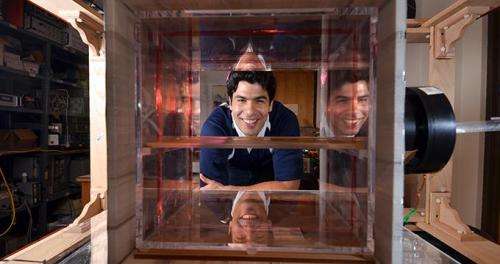Student finds incubators have wildly varying magnetic fields

Lucas Portelli, a doctoral student in the University of Colorado Boulder's Department of Electrical, Computer and Energy Engineering, wanted to know how electromagnetic fields affect living things.
To find the answer, he went about building experiments. He tried to test the impact of the fields on E. coli, on cancer cells, on fruit flies and even on mice. But he quickly ran into a problem: The magnetic fields in the biological incubators he was using weren't consistent. In fact, they weren't even close.
"Every time I opened an incubator, I measured something different," said Portelli, who earned his Ph.D. in December. "I thought, 'Is it just me or is this a widespread problem?' It was hard to answer the question with just anecdotal data."
The variance of magnetic fields in the incubators he was using led Portelli to wonder what he would find if he measured the magnetic fields in other labs across campus. With the help of undergraduate Theodore Schomay, Portelli began knocking on biologists' doors and requesting permission to measure the magnetic fields inside their incubators.
The findings—published this month in the journal Bioelectromagnetics—showed the problem was indeed extremely widespread and that the magnitude of magnetic fields could vary by orders of magnitude between incubators and even within the same incubator.
The results matter because they offer another possibility for explaining why cells sometimes behave differently when grown in identical incubators. Biologists have assumed that those differences, including rates of growth and death, are due to natural variation but it's possible that differing exposures to magnetic fields may play a role.
"Researchers expect that the conditions inside incubators—like the temperature, humidity, light and concentrations of oxygen and carbon dioxide—are homogenous," said Portelli, "because the most important thing is that you can replicate the experiment."
The new study also has implications for other scientists, like Portelli, who are trying to study the health effects of exposing cells to electromagnetic radiation, which can be emitted from a number of sources, including high-voltage power lines and cell phones.
Portelli didn't stop with just identifying the problems with magnetic field variance; he went on to create a solution, which he patented with the University of Colorado's Technology Transfer Office. Portelli's answer is a shield, shaped like a four-sided box nested within a four-sided box, that he says can be built into future incubators to protect the cell cultures inside.
"As scientists work to explore biological systems more deeply and, therefore, look for smaller or more subtle effects, electric and magnetic fields may become another environmental factor that we have to control just as we do with temperature and humidity," Portelli said.
More information: Read more details about Portelli's work here.
Journal information: Bioelectromagnetics
Provided by University of Colorado at Boulder
















